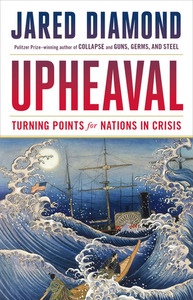You need to sign in or sign up before continuing.
Take a photo of a barcode or cover
Its an interesting framework, and told very compellingly; for better and worse. I appreciated his efforts to emphasize the needed nuance in political discussions, and it was left-ish enough for me to kind of nod along. However it did not overcome my deep seated sceptism of political commentary by white old men.
Interesting book but sadly it only focuses on issues from a single perspective and tends to simplify complex historical events. Diamond’s analysis of these events is also lacklustre a lot of the time. Final rating: 2/5.
Should be a textbook lol. I’d study this for a while
challenging
informative
slow-paced
An interesting read, as most by Jared Diamond are, but the approach of comparing national crises to individual crises didn't really convince or add any interesting perspective.
While the analysis went deep enough to help a reader understand what went on in the minds of the populations at the time, the conclusions remain too theoretically high level for me to find interesting.
While the analysis went deep enough to help a reader understand what went on in the minds of the populations at the time, the conclusions remain too theoretically high level for me to find interesting.
informative
inspiring
reflective
medium-paced
I am of Finnish heritage and didn't know the details of Finland's upheaval. Makes me proud. All of the cases he describes are of particular interest in these days of upheaval in the USA.
I didn't spend much time reading the sections on the traits of his model of national crises. The historical descriptions are the high point of the book.
I didn't spend much time reading the sections on the traits of his model of national crises. The historical descriptions are the high point of the book.
informative
medium-paced
I was a little puzzled at the point of the book for about the first 60%, but it kind of came together at the end. More anecdotal than Diamond’s other books, it definitely struck me as more personal and opinionated than his other works.
informative
reflective
medium-paced
informative
medium-paced


